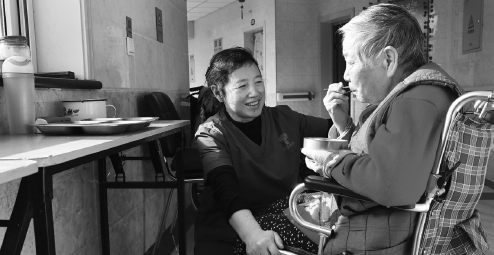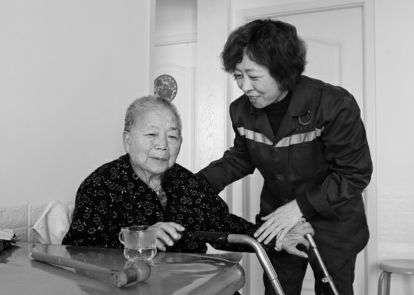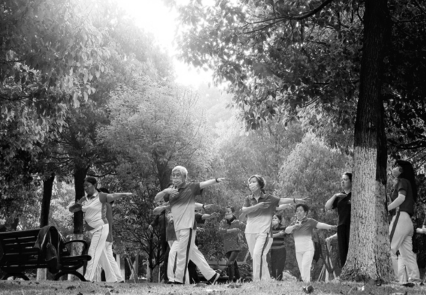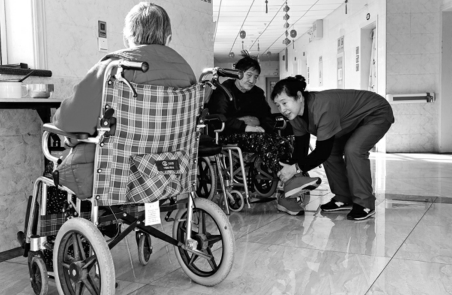Caregivers get a welcome break
Years of tending an elderly parent with a disability can be wearing. It's a full-time job. Now there's a way to get a rest, Xin Wen reports.

Chen Huixian, who is 81, pushed away a caretaker, mumbling something unintelligible. Then she suddenly fell asleep on a chair outside her room.
It's been a week since Chen came to the nursing center. She has Alzheimer's disease and often calls the wrong name of the nursing attendant, confused by the new environment and seemingly numb when her husband visits her from home.
Diagnosed in 2008, she had been taken care of by her husband at their home in Beijing's Fengtai district over the past few years.
Chen and her husband, Cai Jingbo, both retired aerospace researchers, have a son who seldom has time to devote to his mother. He lives in another district of the capital. For a long time, her husband was her main caregiver.
As they both aged, the pressure of tending to her became greater. The time commitment was relentless.
In Chinese society, where the average age is rising rapidly, their plight is not unique. To address the problem, anew service model-respite service-was introduced to provide support for family caregivers in the form of a few days' rest each month.
For those who tend to the needs of disabled seniors or those with dementia over an extended time span, respite service carries a welcome meaning: a short time away-a four-day vacation of sorts-to relieve the caregivers' burden so they can refresh and run their own errands.
"We heard the concept in late December, and decided to send her to the respite service center in January to see how it works," said Cai, the husband.
Respite care, a concept still unfamiliar to Chinese people in most areas of the country, offers four days per month in which a home aide takes over. Alternatively, ailing seniors can be placed a nursing home environment a few hours a week. The concept was first tested in Beijing's Fengtai district as a pilot in November 2018.
Providing care for the elderly, which often also means infirm and vulnerable, is a tradition in Chinese families. The proverb "Raise a child against old age" indicates the importance of filial piety for younger generations.
Aging on the rise
But as the elderly population has expanded in society, the traditional concept of taking care of parents has become much harder to fulfill.
According to a report released by the China Development Research Foundation recently, the country's elderly population is expected to top 300 million by 2035. The population is not likely to peak and start declining until around 2030, when the total population is projected to be as high as 1.44 billion. The population will then drop to around 1.38 billion by 2050.
Zheng Bingwen, director of the Center for International Social Security Studies at the Chinese Academy of Social Sciences, said in an online news conference on June 11 that the demographic structure in China had changed during the 13th Five-Year Plan period (2016-20). For one thing, the number of births has dropped compared with the previous five years
The trend characterized by an aging population combined with fewer newborns has become more obvious in recent years, although the total population in China is still growing, Zheng said. That's largely due to longer life spans.
"The ratio of people caring for the elderly has been raised in the past decade, up 10 percent from a decade earlier, which means the younger generation now bear so much greater financial burden than before," he said.
The discrepancy is more prominent in big cities, such as Beijing. Some middle-aged people in the capital wanted to have more free time after work; instead, they found themselves spending more time taking care of their elderly parents.
For families with seniors who are disabled or who have Alzheimer's, long-term care is even more challenging. According to the National Health Commission as of the end of 2018, the number of elderly people over 60 years old had reached 249 million. Of those, more than 180 million had chronic diseases and nearly 40 million were disabled or partially disabled.
Pilot in Fengtai district
"Many in the younger generation who took care of their elderly parents were exhausted after attending to their needs for a long period of time, and they were eager to take a break," said Xing Yinli, director of Jingkangyuan Nursing Center, one of the eight institutions in Beijing's Fengtai district that has provide dintermittent care for more than 1,200 seniors since the pilot program started.
"Some even said that they would rather not face their parents if it wasn't necessary," said Xing, describing the feeling that some middle-aged people expressed. Being a caregiver is just hugely time-consuming.
Fengtai district, located in the capital's southwestern area, had the highest proportion of elderly in Beijing, including more than 10,000 disabled seniors or those with dementia, according to the local civil affairs department.
And so it was a welcome relief when, in 2018, the first batch of around 400 seniors received respite care services either at home or in institutions by health care professionals in Fengtai.
Under Fengtai's regulations, any household with an elderly male over 60 years old can apply for the short-term care. The standard nursing expense is set at 220 yuan ($31) per day-all of it covered by the government.
"It's really a relief for me," said Song Xueying, who had taken care of her 92-year-old mother, Wang Shulan, at home for 15 years after her mother suffered a blood clot.
In the daytime, Song hardly left her mom. She mostly bathed and cleaned the elder woman herself. To stay close, Song took an apartment next to her parents' home.
Song had operated a chain restaurant before, but because of her mother's frail health, which required a person to attend to her continuously, she decided to stay at home.
"I was extremely worried that something would happen when I left them, so over the past decade, I chose to take care of them myself, doing the best I could," Song said. The 58-year-old has lumbar muscle strain herself and almost never has time to exercise.
Previously, Song had tried to employ a home care worker to assist her. But the high expense eventually killed the idea.
In January, her family welcomed a nursing worker provided by the respite care service program from Jingkangyuan Nursing Center. The worker provided short-term in-home, care four days a month free of charge.
"Some daily care activities, like cooking, washing hands or helping my mom take her medicine, were handled by another person instead of me, and I was very glad," Song said. "I love my mom so much, but increasingly, I feel I can't afford to shoulder the entire burden."
Halo effect
The impact of short-term care when people with dementia are placed in a healthcare center, even temporarily, is huge in the long run, said Jia Yaqun, geriatric care manager at Jingkangyuan, who is also responsible for the respite service care provided by the center.
She recalled an elderly man with dementia who received short-term care at the center in 2018. The man was mentally withdrawn and not very responsive whenhe arrived at the center. Numb would have described his condition. He had spent a long time at home on his own without talking to others, and his relatives had little time to care for him.
After a month of short-term care in the center, he began to wave his hands and took the initiative to communicate with others before his time was up and he returned home, Jia said.
"This man's situation became much more positive after he returned home," Jia said, adding that man often spoke of moments he remembered at the care center. He was simply happier.
"Respite care may seem short time, but there's a halo effect for the elderly men who received the care over time. That, in turn, helps the family quite a lot," she said.
Home care recommended
Of the two tracks for respite care-in-home or at a care center-Jia doesn't hesitate to recommend home.
"After all, an entirely new environment adds to a vulnerable person's discomfort, and that will not strengthen their mental health or aid in their recovery," she said.
Given the aging population in Beijing, more attention should be paid to elderly care, as parents of the one-child generation enter their sunset years.
"More than 500 seniors are added to the population every day, on average. Of those, more than 120 are over 80 years old," said Li Hongbing, deputy director of the Beijing Civil Affairs Bureau.
The respite service piloted in Fengtai district may be a good starting point for the city to explore multiple ways of taking care of its elderly, while at the same time relieving the stress of those who for so long have tended them, Li said.
"One day, there will be more elderly people than younger people in Beijing, and the aging trend is gaining speed lately," he said.
"Respite care service, or short-term care, is not the solution to all problems, but it's a good approach to spur the future development of home care services for seniors, and to make more people realize the severity of the situation."
Cai Jingbo, Chen's husband, initially accompanied his wife during her time in the nursing center, day and night, paying out of pocket for an extended stay. He slept in another bed in the same room to keep a close eye on her. After a week, Chen had become familiar with the place and decided to return home. But he continued to visit once every a couple of days.
"Even if she was fine at the nursing center, I couldn't stop worrying about her," Cai said. "And after one period of respite-about 30 days-I took her home again."




Today's Top News
- China sets a world record in maglev technology
- Xi chairs CPC leadership meeting on Party conduct, anti-corruption work
- Why Hainan Free Trade Port stands out
- Rule of law strengthens business environment
- Documents affirm one-China principle
- Central SOEs urged to push upgrading






























